Feedback Letter For Teacher
Subject: Appreciation and Feedback
Dear [Teacher's Name],
I hope this letter finds you in good health and high spirits. I am writing to express my sincere gratitude and appreciation for your outstanding efforts as my [subject] teacher this past academic year at [school name]. I wanted to take this opportunity to share my feedback and let you know how much of a positive impact you have had on my learning experience.
First and foremost, I would like to commend you on your exceptional teaching skills and your ability to create an engaging and interactive classroom environment. Your passion for the subject matter shines through in every lesson, making it enjoyable and stimulating for all students. Your creative teaching methods, including the use of visual aids, group discussions, and real-life examples, have significantly enhanced my understanding of the subject.
Moreover, your dedication to your students' success is truly remarkable. You consistently go above and beyond to ensure that each student is given the attention they need. Your willingness to provide extra assistance during office hours and your prompt and valuable feedback on assignments have played a crucial role in my academic growth. I genuinely appreciate the time and effort you invest in helping your students achieve their full potential.
Additionally, your approachability and genuine care for your students' well-being have made a significant difference in my educational journey. Your open-door policy and willingness to listen and address any concerns or questions have fostered a supportive and inclusive learning environment. I always felt comfortable approaching you for guidance and support, which greatly contributed to my confidence and overall learning experience.
Lastly, I would like to mention the positive impact you have had on my personal development. Your encouragement and belief in my abilities have motivated me to strive for excellence and to explore my potential beyond the classroom. Your emphasis on critical thinking, problem-solving, and self-reflection has not only improved my academic performance but has also equipped me with valuable life skills that I will carry with me in the future.
In conclusion, I would like to express my heartfelt gratitude for your exceptional teaching and unwavering dedication to your students' success. Your passion, knowledge, and commitment have made a profound impact on my academic journey, and I am truly grateful to have had the privilege of being your student. You have inspired me to continue learning and to pursue my dreams with determination and confidence.
Once again, thank you for everything you have done for me and for being an extraordinary educator. I wish you continued success and fulfillment in your teaching career.
With utmost appreciation and warm regards,
[Your Name]
Positive Feedback Letter for Teacher
Subject: Appreciation for Your Dedication
Dear [Teacher Name],
I wanted to take a moment to express my sincere appreciation for your dedication and hard work in [subject/class]. Your innovative teaching methods and commitment to student success have greatly enhanced the learning experience.
Your ability to engage students and make complex topics accessible is truly commendable. Thank you for your continuous support, guidance, and encouragement.
Warm regards,
[Your Name]
[Position, if applicable]
[Institution/Organization Name]
Constructive Feedback Letter for Teacher
Subject: Feedback on Classroom Experience
Dear [Teacher Name],
I would like to share some feedback regarding your teaching in [subject/class]. While your dedication and enthusiasm are highly appreciated, there are areas where improvements could enhance student engagement further.
For instance, incorporating more interactive activities or providing additional examples could help clarify complex concepts. I hope you find this feedback helpful as you continue to develop your teaching approach.
Sincerely,
[Your Name]
[Position, if applicable]
[Institution/Organization Name]
Thank You Feedback Letter to Teacher
Subject: Gratitude for Your Guidance
Dear [Teacher Name],
I am writing to express my gratitude for your guidance and support throughout this academic year. Your patience, knowledge, and encouragement have made a significant impact on my learning journey.
Thank you for fostering an environment that motivates and inspires students. Your efforts are truly appreciated.
Best regards,
[Your Name]
[Student/Class Name]
Formal Feedback Letter to Teacher
Subject: Formal Feedback on Teaching Performance
Dear [Teacher Name],
As part of our ongoing evaluation process, we are providing feedback regarding your performance in teaching [subject/class]. Your organization, preparedness, and engagement with students are noted as strengths.
We recommend exploring additional teaching strategies to further enhance participation and comprehension among students. We value your commitment to professional development and look forward to your continued contributions.
Sincerely,
[Administrator/Principal Name]
[School/Institution Name]
Casual Feedback Email to Teacher
Subject: Feedback on Your Class
Hi [Teacher Name],
I just wanted to share some thoughts about your class. I really enjoy your teaching style—it makes learning [subject] fun and engaging. I think adding a few more interactive sessions could make it even better.
Thanks for all your efforts and support. Keep up the great work!
Best,
[Your Name]
What / Why Section
What is a Feedback Letter for Teacher and Why It Matters
A feedback letter for a teacher is a written communication providing constructive, appreciative, or evaluative input about their teaching methods or classroom performance.
Purpose:
- Recognize the teacher’s efforts and accomplishments.
- Provide constructive criticism to enhance teaching effectiveness.
- Foster positive relationships between students, parents, or administrators and teachers.
- Support professional development and classroom improvement.
Who Should Send Feedback Letters to Teachers
Authorized Senders
- Students providing peer or parent-student feedback.
- Parents or guardians evaluating the child’s learning experience.
- School administrators or principals conducting teacher performance reviews.
- Colleagues or fellow teachers in peer review scenarios.
Whom the Feedback Should Be Addressed To
Recipients
- The individual teacher receiving feedback.
- School administration for formal evaluation purposes.
- Department heads when feedback is performance-related.
- Optional: include colleagues for peer-to-peer feedback loops.
When to Send a Feedback Letter to a Teacher
Timing
- At the end of a term or semester.
- Following completion of specific projects, courses, or teaching periods.
- After significant improvements or interventions in teaching methods.
- During formal evaluation cycles or parent-teacher review meetings.
How to Write and Send Feedback Letters
Process
- Begin with a personalized greeting to the teacher.
- Clearly state the purpose of the feedback.
- Highlight strengths, achievements, and positive impact.
- Offer constructive suggestions for improvement, if necessary.
- Close with appreciation and encouragement.
- Choose the appropriate medium: email for quick communication or printed letter for formal evaluation.
Requirements and Prerequisites
Before Writing
- Gather observations about the teacher’s performance, lesson planning, and student engagement.
- Decide on the type of feedback: positive, constructive, or mixed.
- Collect examples or evidence to support feedback points.
- Determine the appropriate tone based on relationship and context.
Formatting Guidelines
Letter Formatting
- Length: typically 150–300 words for clarity and focus.
- Tone: professional, polite, and respectful; informal tone can be used for casual feedback.
- Style: formal letter for administration or printed feedback; email for personal or student feedback.
- Include greeting, clear feedback content, and closing.
Tricks and Tips for Effective Teacher Feedback
Best Practices
- Be specific and provide examples to illustrate feedback.
- Focus on behavior and methods, not personal traits.
- Balance positive comments with constructive criticism.
- Keep the message concise and actionable.
- Proofread to ensure clarity and professionalism.
Common Mistakes in Teacher Feedback Letters
Pitfalls to Avoid
- Being vague or overly general in feedback.
- Using harsh or negative language that may offend.
- Ignoring positive aspects of teaching.
- Overloading feedback with too many points at once.
- Forgetting to personalize the letter for the teacher.
Elements and Structure
Key Components
- Subject line specifying the type of feedback.
- Personalized greeting addressing the teacher.
- Introduction explaining the context or reason for feedback.
- Highlight of positive points and strengths.
- Suggestions for improvement, if necessary.
- Closing with appreciation, encouragement, or support.
- Optional attachments or supporting documents for formal evaluations.
Pros and Cons of Sending Feedback Letters
Advantages and Disadvantages
Pros:
- Encourages teacher improvement and professional development.
- Strengthens student-teacher or parent-teacher relationships.
- Provides documented feedback for future reference.
Cons:
- May be misinterpreted if not worded carefully.
- Risk of appearing overly critical or biased.
- Time-consuming if multiple points and examples are included.
After Sending / Follow-up Actions
Next Steps
- Confirm that the teacher received the feedback.
- Discuss key points if necessary in person or through a meeting.
- Monitor improvements or changes based on feedback.
- Maintain professional communication for ongoing development.
FAQ About Feedback Letters for Teachers
Common Questions
-
Q: Should feedback be anonymous or signed?
A: Depends on context; students may submit anonymous feedback, but formal evaluations should be signed. -
Q: Is constructive criticism appropriate?
A: Yes, if delivered respectfully and with actionable suggestions. -
Q: Can feedback be both positive and negative?
A: Balanced feedback is often most effective, highlighting strengths and areas for improvement. -
Q: What is the ideal length?
A: Typically 150–300 words for clarity and focus.
Does It Require Attestation or Authorization?
Authorization Notes
- Formal feedback for performance evaluation may require approval by school administration.
- Signed letters may serve as documentation in personnel files.
- Informal or student-submitted feedback generally does not require attestation.
- Ensure compliance with institutional policies regarding teacher evaluations.

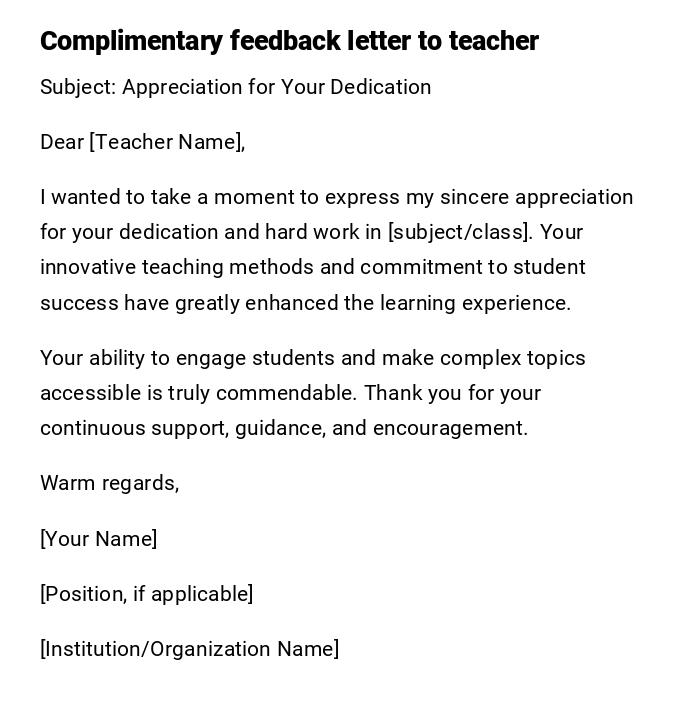
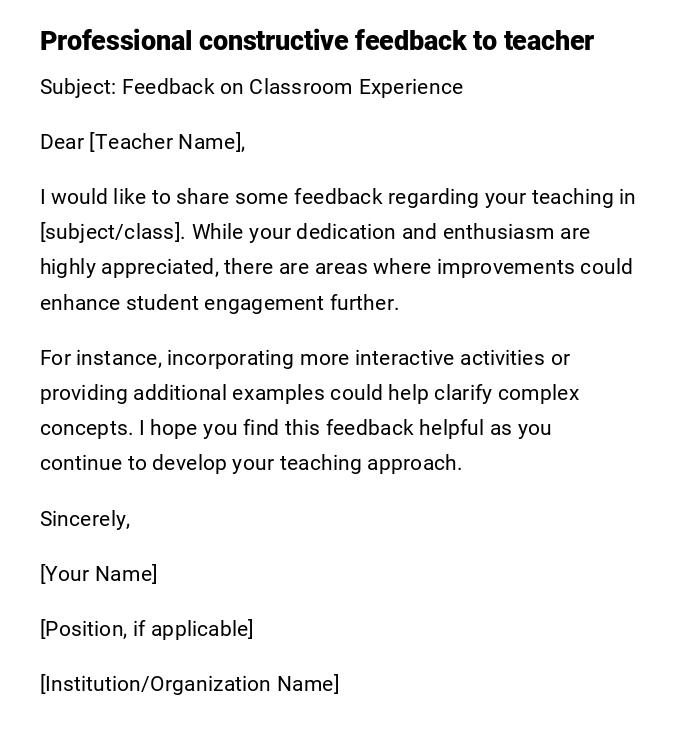
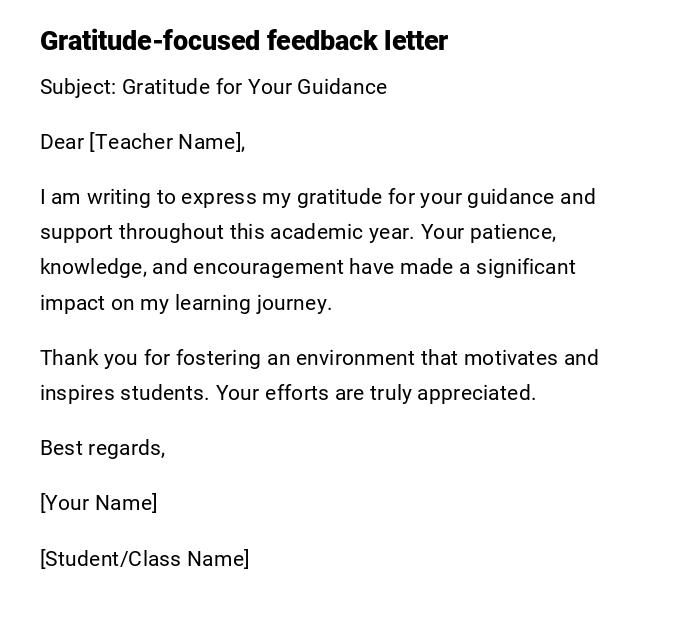
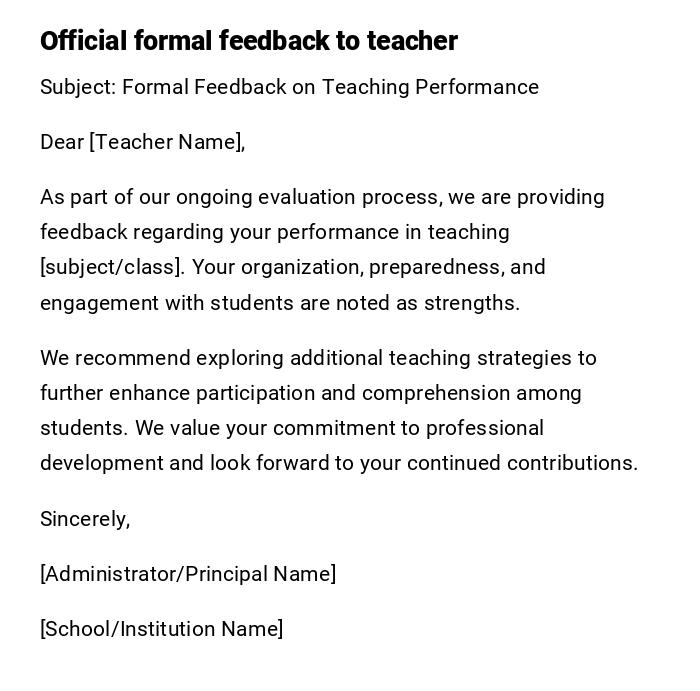
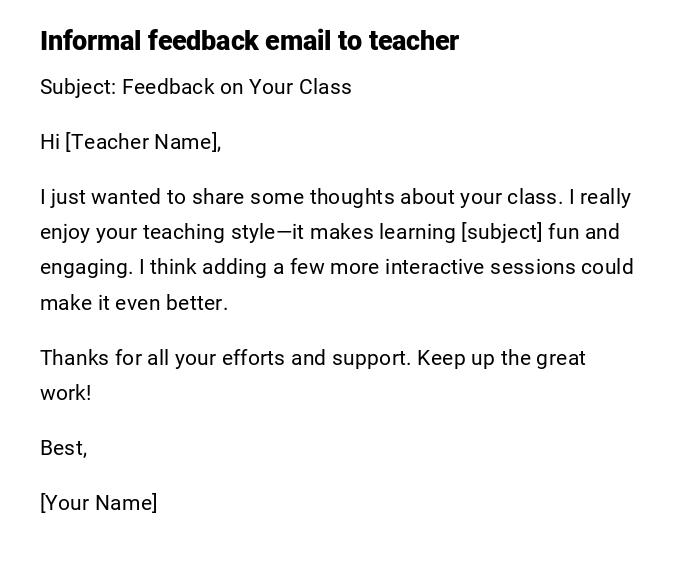

 Download Word Doc
Download Word Doc
 Download PDF
Download PDF